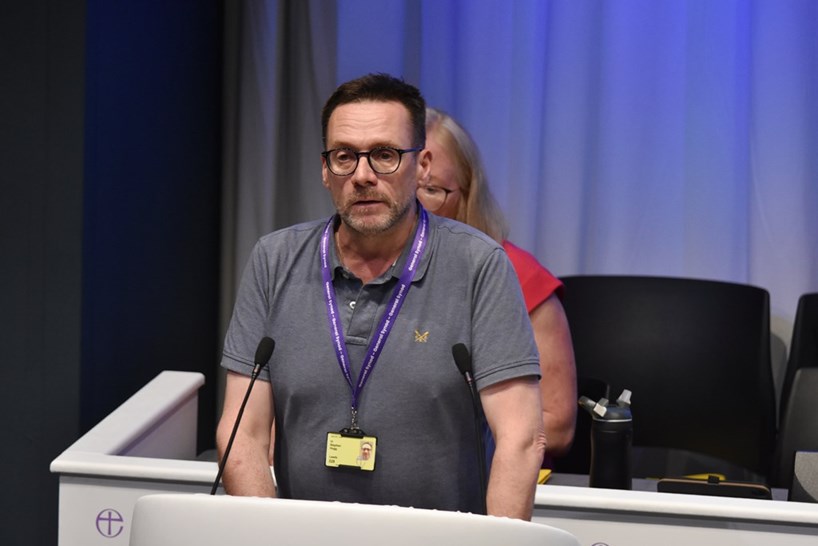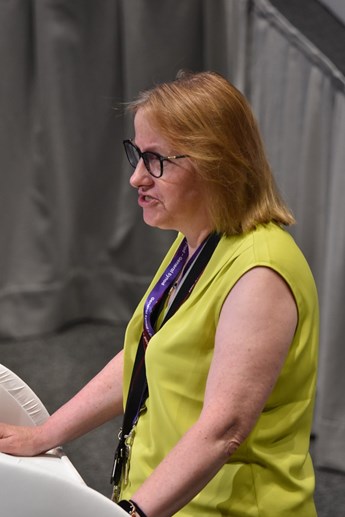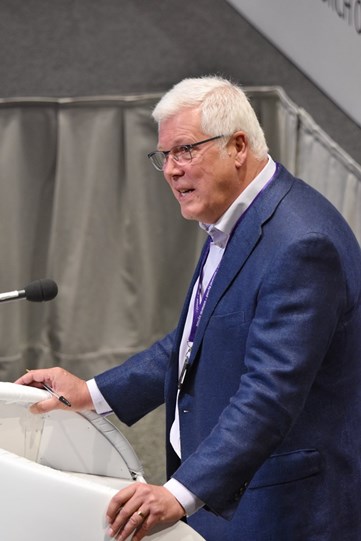THE extent of the General Synod’s ability to shape the spending of the Church Commissioners’ funds was explored during this week’s meeting in York.
During a debate on the spending plans for 2026 to 2028, drawn up by the Triennium Funding Working Group (TFWG), members were warned by the bishops that voting in favour of amendments would produce an “unravelling” with “unintended consequences”.
On Sunday, members gave final approval to the National Church Governance Measure, under which the General Synod will no longer have the power to approve the budget of the body set to replace the Archbishops’ Council: Church of England National Services (CENS). The budget was “properly a matter” for the CENS trustees, Synod was told, bringing the Church of England into line with best practice in charity governance.
The two debates, both of which included failed attempts to bring amendments, followed a review of the Church’s governance that warned of a widespread lack of clarity about “the extent to which [Synod] has (or should have) oversight of the NCIs’ work” (News, 7 July 2023).
The 2023 report of the National Church Governance Board suggested that the phrase “synodically-governed” was “unhelpful . . . as it supports the widespread misconception in the media that General Synod is the Church’s governing body, when this is not the case.
“The General Synod sets the budget of just one of the NCIs, elects board members to some but not all of them, receives annual reports from some but not all of them, and can pass motions ‘calling upon’ any of them to do things which it cannot necessarily enforce. Neither is Synod the governance body for the NCIs; they are registered charities subject to separate regulation of their governance (e.g. by the Charity Commission).”
 Sam Atkins/Church TimesStephen Hogg (Leeds), who chairs the revision committee, presents the Measure
Sam Atkins/Church TimesStephen Hogg (Leeds), who chairs the revision committee, presents the Measure
The report suggested that “serious consideration” be given to the reform of the Synod and synodical government generally.
The Governance Measure that was given final approval by the Synod on Sunday establishes CENS as a charity, incorporating the functions of the Archbishops’ Council. It requires CENS to prepare a funding framework to send to the Church Commissioners, setting out its objectives and how it proposes to meet them. It also requires CENS to lay before the Synod a summary of the proposals for inclusion in this framework and to have “due regard” to the view expressed by Synod.
The completed framework must be returned to Synod, accompanied by a statement setting out “how the view of the Synod has affected the framework”.
Although CENS must lay its budget before Synod, it does not require the Synod to approve it, and the budget may be laid out after the year to which it relates has begun. The Measure establishes a permanent Synodical Scrutiny Committee to “scrutinize national decisions taken by the NCIs” — a recommendation of the governance review, which identified a need for Synod to have “greater transparency around what decisions have been taken and how” and warned of high levels of mistrust.
Presenting the Measure, Stephen Hogg (Leeds), who chairs the revision committee, said that it did not replicate the model of Synod approving the Archbishops’ Council’s budget, “as it is clear that it is the trustees of the charity who have that legal responsibility”. A majority of members of CENS would be Synod members, he reminded the chamber.
“No-one is seeking to diminish the proper involvement of Synod, but members do need to understand there is a rather fundamental principle of charity law at play about the responsibility of the charity’s trustees,” he said.
 Sam Atkins/Church TimesJulie Dziegiel (Oxford)
Sam Atkins/Church TimesJulie Dziegiel (Oxford)
He urged the Synod not to replicate “models that we know are problematic. . . Synod may have all sorts of things they would love to fund and the role of the trustees will often be to temper those expectations.”
An unsuccessful amendment was brought by the Revd Paul Benfield (Blackburn) which would have restored the requirement for Synod’s approval of the budget. “Does Synod want to have control of the finances of the Church of England or does it want to leave it to someone else so that Synod just becomes a talking shop?” he asked.
Adrian Greenwood (Southwark) said that, in his 25 years as a member, the budget had never been voted down. “Our job is to feed in at the beginning and scrutinise at the end, but let them make the decision,” he said.
Mr Benfield was supported by some lay members: Clive Scowen (London) said that it was “incredibly improbable” that the Synod would ever exercise its power to say “no” to the budget, “but the existence of the power is very important in the dynamic between Synod and CENS board as to how they work together.”
Julie Dziegiel (Oxford) pointed out that dioceses had to get budgets approved by diocesan synods. There was, she suggested, a “not insignificant amount of financial expertise within this Synod, which would be diluted”.
Echoing the governance review, Carl Hughes, chair of the Archbishops’ Council’s finance committee, lamented “the lack of clarity across the Church as to who is responsible for what. . . I think Synod absolutely has an interest in understanding and seeing what is in the Archbishops’ budget and how that relates to funding streams that have been agreed, but it is the duty of trustees to determine if they are satisfied with that budget.”
It was a “myth”, he said, that the Synod had in the past approved the Archbishops’ Council’s budget. “All you had agreed is votes on five expenditure items” — a reference to expenditure funded by diocesan apportionment, set to be abolished in the next triennium.
On Monday, the Synod will be asked to approve the Archbishops’ Council’s budget for 2026. It follows a debate last July, in which members complained about the format for debating the budget, which was described as “stilted” and “constrained”.
At the time, the Bishop in Europe, Dr Robert Innes, told members that he had felt “uneasy . . . that the Synod is not scrutinising the operating budget of the Archbishops’ Council to the degree that I would feel comfortable with” (News, 12 July 2024).
On Saturday, the Synod approved the spending plans set out for the next triennium, after voting down amendments (News, 9 June).
Nic Tall (Bath and Wells) brought one requesting that 75 per cent of the £236 million allocated to the Diocesan Investment Programme be allocated directly to Diocesan Stipend Funds.
The Bishop of London, the Rt Revd Sarah Mullally, who chaired the TFWG, warned: “We cannot pick and choose from the menu. This is an integrated package and unravelling it at this late stage will have unintended consequences for the Church, dioceses, parishes and mission.” This message was echoed by the Bishop of Norwich, the Rt Revd Graham Usher.
 Sam Atkins/Church TimesCarl Hughes, chair of the Archbishops’ Council’s finance committee
Sam Atkins/Church TimesCarl Hughes, chair of the Archbishops’ Council’s finance committee
On Friday, the Synod had voted in favour of an motion amended by the Bishop of Sheffield, Dr Pete Wilcox, which welcomed the “greater level of stakeholder engagement” that had informed the spending plans for 2026-28 and called upon the Business Committee to “schedule early in the next triennium a full debate that will enable Synod to express its view on the approach to disbursing funding, including support for local stipendiary ministry”. During the debate, concerns about a financial crisis in dioceses and parishes were aired (News, 12 July).
The Synod has been advised in previous years about where decision-making power lies when it comes to spending plans. In 2015, at the start of the Renewal and Reform programme, which introduced Strategic Development Funding and entailed breaking with the Church Commissioners’ “famous intergenerational rule”, the then First Church Estates Commissioner, Sir Andreas Whittam Smith, told members that he had insisted on bringing the plans to them.
He said at the time: “As a matter of fact, the Church Commissioners have all the legal powers they need to make these decisions on their own, but I do not think that is right in these circumstances. I think we should go much further than the legal requirements.”
The Turnbull Report of 1995, which gave rise to the current governance structures, envisaged that the “National Council” — which became the Archbishops’ Council — would “prepare the budget for national Church responsibilities and present it to the General Synod for approval, setting it within the wider context of an overview of the Church’s finances as a whole”.

















